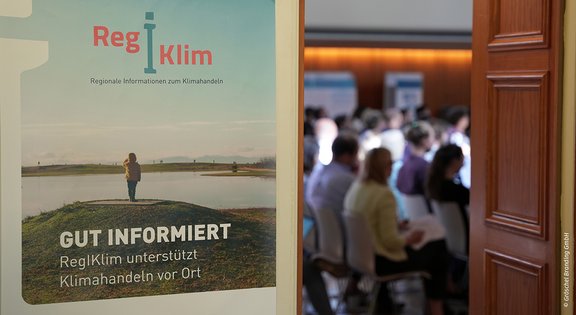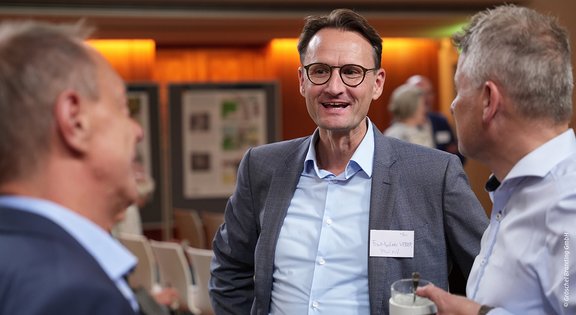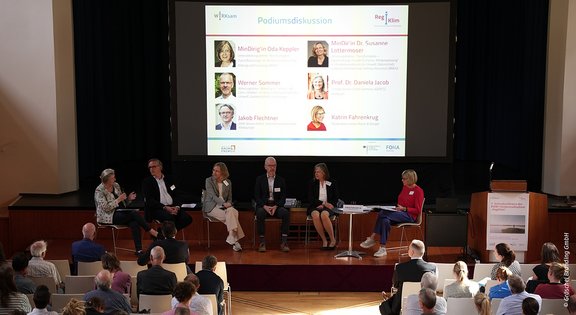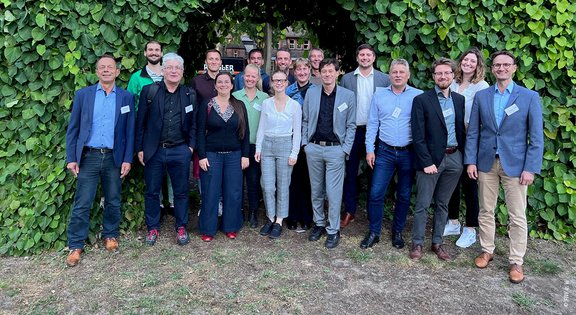RegIKlim status conference to kick off second funding phase
R2K-Klim+ exchanges ideas with other research projects in Berlin
The research project "Strategic Decision Support Tool for Adaptation to Climate Change on the Regional and Communal Level in the Rhine Catchment - R2K-Klim+", funded by the BMBF within the framework of the RegIKlim Directive, presented its interim results at the start of the second funding phase (09/23 - 08/26) at the 3rd RegIKlim Status Conference in Berlin. In interdisciplinary workshops, the participants of the eight funding projects discussed common challenges. The overarching goal of the funding program remains the development of appropriate climate services for adaptation to the impacts of climate change.
Global climate change and its consequences affect a wide range of spatial levels - from entire regions to individual municipalities. Local extreme weather events with corresponding consequences, such as small-scale flooding due to heavy rainfall events or heat-related stresses on people, have occurred with increasing frequency in the past. At the same time, regions are also exposed to climate change-related extreme events that have large-scale effects: High and low water levels on rivers not only have a regional impact, but frequently affect the entire river basin. The effects of these and other climate change-related events and thus also the potential damage in the affected regions are very differentiated due to various factors - such as the different spatial location or the economic structures. However, there is usually no well-founded basis for decision-making at the regional and municipal level.
In this context, a concept for the city of Duisburg was developed in the BMBF project R2K-Klim+, in which possible future scenarios are created with the help of climate projections and the influences of regional and supraregional effects of climate change impacts are presented. Based on the results of the first funding phase, the six-member consortium coordinated by FiW will push ahead with the development of a cross-sectoral decision support system (DSS) for the city of Duisburg. The prototype of the EUS is already available online (r2k.geomer-maps.de) and was presented to the other model regions at the status conference.
In the second funding phase, the interdisciplinary consortium of water management, ecology, politics and social research, logistics, transport and regional economy will pursue four focal points.
The modeling work of the consortium partners will be supplemented by further types of measures. These are simulated in the models by varying the model parameters. The difference between the model results (e.g. expected damage values, affected persons, value added losses) can be used to derive the effectiveness and thus the benefit of the measures. Another focus is on the integration of climate scenarios. The climate data for the SSP3-7.0 scenario still to be provided by the cross-sectional project NUKLEUS will also be imported into the models in order to take into account potential climate impacts of the coming century.
The results of the modeling work will be used to further develop and plausibilize the existing assessment methodology. For this purpose, it is necessary to develop assessment indicators together with potential users. The indicators will be derived from the model results in order to enable as many quantifications as possible. At the same time, however, special requirements of the municipal administrations for the evaluation of measures have to be taken into account, which have to be collected, for example, via expert knowledge and literature. In this context, it will be examined to what extent these evaluation methods can be transferred to other municipalities.
Finally, both the model results and the assessment methodology will be used to visualize the impacts of climate change and climate adaptation measures in a web-based DSS. Besides the integration of these data streams, the central challenge will be the implementation of the DSS into the spatial data infrastructure of the city of Duisburg. This is necessary in order to integrate the system into the daily administrative activities of the municipality in the future.
This work will be flanked by an addressee-specific communication strategy. The consortium is addressing its findings not only to municipalities, but also to associations, companies, the professional public and civil society. In order to limit the complex interactions and interrelationships to the information relevant for the stakeholders, it is necessary to adapt the risk and science communication to the respective target group. In addition, application support for the use of the DSS will be offered to municipal users.
In the second funding phase, FiW will work on the hydrological and hydraulic modeling in the Rhine catchment area as well as the damage potential analysis in Duisburg, the further development of the assessment methodology, the elaboration of the addressee-specific communication strategy and the regional economic modeling of the consequences of low water.
The topic of heavy rainfall - hydrological and hydraulic modeling - is being handled by geomer GmbH, which is also technically designing the web-based decision support system. The Rhein-Ruhr-Institut für Sozialforschung und Politikberatung (RISP) e. V. at the University of Duisburg-Essen is responsible for the socio-political processing and contributes its expertise from the political environment in the Ruhr area. The Research Institute for Ecosystem Analysis and Assessment at RWTH Aachen University (gaiac) e. V. will further investigate the thermal load of the population and the effects of drought on Duisburg's floodplains and urban greenery. The Center for Logistics and Transport (ZLV) at the University of Duisburg-Essen is responsible for inner-city traffic modeling in the city of Duisburg.
The RegIKlim status conference on 19th/20th Septembre 2023 at the Evangelisches Johannesstift Tagungszentrum in Berlin offered the funded projects a status review on the topic of climate impact adaptation in the other model regions. Through short presentations and project stands, the projects informed each other about the current status and identified common challenges. In four cross-thematic and cross-project workshops, participants from the six model regions and two cross-sectional projects discussed potential methods and solutions. The professional exchange will also be maintained in the second funding phase by various working groups of the accompanying research. In addition, the R2K consortium is also planning several bilateral consultations on individual key topics with the other research networks.
The progress of R2K-Klim+ can still be followed on the project's own website:
www.r2k-klim.net










